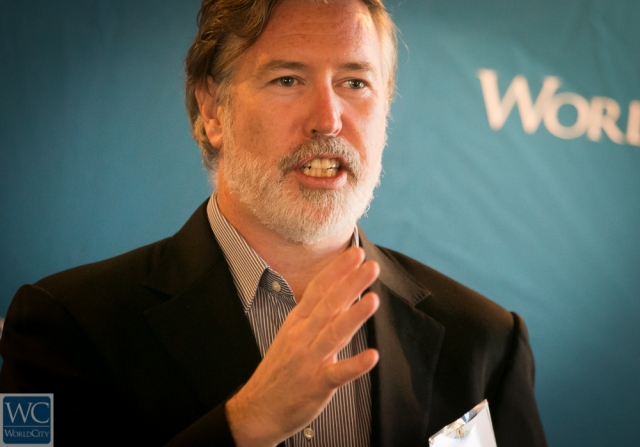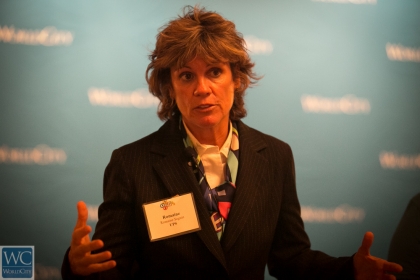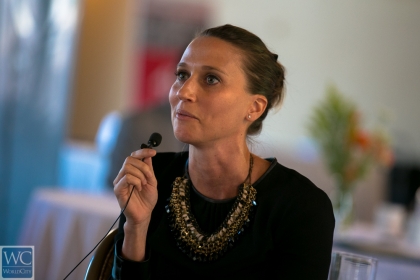How senior leaders see HR: Clorox, UPS, Accenture at HR Americas

Ask senior executives what they expect from their HR departments these days, and the list is long: Compensation and benefits. Employee engagement surveys. Planning. Learning and development. Organizational design. Total rewards. Branding. Communications. And input on profits and losses.
Why such far-reaching requirements?
“HR wasn’t sitting at the table before. Now, it is,” summed up Michael Costello, senior vice president for operations outside the United States for consumer goods veteran Clorox.
Costello was one of three senior executives to share with attendees at HR Americas. Also featured were Romaine Seguin, president of cargo company UPS Americas, and Jorge Benitez, recently retired chief executive of North America for consulting giant Accenture.

Romaine Seguin, president of cargo company UPS Americas
The three senior leaders agreed HR has a more strategic role at multinationals these days, as companies aim to ensure talent is engaged, productive and helping meet the company’s business goals. HR is more complex too, as business becomes more global, workers more educated and competition stiffer.
“More progressive HR leaders are looking at how to be more efficient to dedicate budgets to higher-value activities,” Benitez told the group.
Clorox: Empowering employees as “business owners”
At Clorox, one core HR strategy is engaging employees as “business owners.” That accounts for about 45 percent of scores on performance evaluations, Costello said.
“The old style of managers telling people what to do is gone,” he said. Instead, leaders are asked to empower their teams to find ways to achieve goals, including seeking out training as needed.
Costello said he learned the importance of empowering others when he was just 28. He was asked to lead a product supply group, with 50 people reporting to him mostly in their 40s and 50s. He let his team know they could suggest changes and take risks, and productivity tripled in three months.
“I believe fundamentally everyone comes to work to do a good job. It’s only the barriers we put in place that keep people from doing that,” Costello said. “All we did there was make people feel empowered.”
UPS: Cultural understanding and diversity matter
Seguin, who has worked for UPS in the United States, UK, France and Italy and now runs business in more than 50 nations, stressed the importance of cultural understanding and diversity for HR leaders.
“To try to impose U.S. culture in any of our countries is not advisable. It would create tension and not allow for the best results,” she told the group.
Similarly, HR professionals must adjust to different labor laws across borders. For example, Brazil has a strict and structured process for filing and handling grievances. And most employees belong to a union-like workers council, even management.
“Even our country manager in Brazil belongs to a union,” said Seguin.
Mexico, in contrast, has less stringent labor laws, and not all employees are unionized there, she said.
Companies also have own internal cultures that affect HR. At UPS, there’s a formal and strict process to advance up the corporate ladder.
“I started my career loading and driving a truck and so did our CEO,” said Seguin.
Accenture: Where senior leaders train those coming up
HR is especially key at consulting firm Accenture, where “our talent is basically what differentiates us,” said Benitez, the recently retired CEO for North America.
Worldwide, Accenture has revenues of about $30 billion, with 300,000 employees at an average age of late 20s active mainly in management, digital and tech consulting, he said. Surveys show more than 70 percent of employees are “highly engaged.”
The company spends more than $800 million per year in training and development to keep employees proficient at their jobs and able to advance. Those in more senior positions teach those more junior. “That’s been a big part of our success,” said Benitez.
How do your hire?, asked Gustavo Higuera, regional vice president for Latin America at Weichert Workforce Mobility.
Accenture screens some 2.5 million to 3 million applications to interview a couple hundred thousand people and hire 70,000, said Benitez. In interviews, it looks for critical behaviors, teamwork and communication skills, not just their specific technical skills.
That hiring process has helped keep retention rates at more than 90 percent overall and at more than 98 percent for high-performers, said Benitez.
How do you engage senior leaders to train and make sure they’re best to do it?, asked Fiona Humphrey, HR director in Miami for NBC Universal.
Accenture has a tradition of in-house training that goes back decades. Those trained evaluate the teachers and results are posted and used in performance reviews, said Benitez.

Fiona Humphrey, HR director in Miami for NBC Universal.
How do you encourage diversity at the senior level, including Hispanics?, asked Marjorie Kean, a managing director with Diversified Search in Miami.
Cuba-born Benitez said he’s seen “a real evolution” in his decades at Accenture. When he began, there were no women partners. Now, more than 20 percent of partners are women, though “it’s not good enough,” said Benitez.
The shift came partly from clients, who are more likely to hire consultants who look like them. Employee resource groups – for women, Hispanics and others – also help to advance the concerns of different types of employees.
Plus, management has recognized that diversity helps business and profits.
“It’s really about multiple perspectives generate better solutions,” said Benitez.
HR Americas is part of HR Connections, one of six event series organized by media company WorldCity to bring together multinational executives in the greater Miami area.
The HR Americas conference was sponsored by University of Miami School of Business Administration, ECS Partners International, Diversified Search, Employee Mobility Solutions and Littler Global.